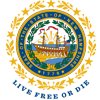Karner Blue Butterfly and Concord (NH) Pine Barrens Project
Important Information on Karner Blue Butterfly and Concord (NH) Pine Barrens Project
 Project Goal: To establish a viable population of Karner blue butterfly (Lycaeides melissa samuelis) in Concord, NH and to maintain the Concord Pine Barrens through habitat management.
Project Goal: To establish a viable population of Karner blue butterfly (Lycaeides melissa samuelis) in Concord, NH and to maintain the Concord Pine Barrens through habitat management.
Timeline: NH Fish and Game's Nongame Program began restoring the Concord Pine Barrens in 2000 and began releasing captive reared Karner blue butterflies in 2001. Periodic habitat management will always be necessary to maintain the Pine Barrens as a suitable habitat for Karner blue butterflies to survive.
Location: Approximately 300 acres of Pine Barrens habitat in Concord, NH.
Description: In 1999, the Karner blue butterfly was thought to be extirpated from New Hampshire. The last place it was observed was in a power line corridor in Concord. Working closely with the U.S. Fish and Wildlife Service, New Hampshire Fish and Game biologists began collecting Karner blue butterfly eggs at the next closest and stable population in New York. The team developed captive rearing techniques resulting in thousands of adult butterflies released into the wild.
Habitat management is performed on the Concord Pine Barrens to mimic the historic natural disturbance that maintain Pine Barrens vegetation. Some of the techniques used are controlled burning, brush cutting and planting of native vegetation. NHFG biologists adhere to adaptive management which allows the management techniques to change over time as specific outcomes due to timing and intensity change the result. Controlled burning reduces leaf litter and duff, reduce non-native vegetative species, and promote sunny and sandy openings for native Pine Barrens vegetation to grow.
Over the years, several groups have helped the program thrive. "Kids for Karners" started in 2000 as a way to engage area school children in the Karner blue butterfly and Concord Pine Barrens project. Over the course of 15 years, thousands of Concord School kids grew lupine in their classrooms and planted it in the spring to improve habitat for the butterflies. The New England Zoo and Aquarium Conservation Collaborative, a conservation group initiated by Roger Williams Park Zoo, began volunteering in 2000. This group has helped to grow wild lupine and plant it in the Concord Pine Barrens, volunteered in the captive rearing lab and in the field to cut brush, pick wild lupine seed, and help with trail work.
All of these actions have resulted in the successful establishment of a population of Karner blue butterflies in the wild. Surveys in 2016 documented the population meeting the federal recovery goal of 3000 butterflies for the first time. In addition, the state endangered Frosted Elfin has over doubled its population at the site with an estimate of 3000 - 4500 adults in 2018!
 Project Partners since 2000:
Project Partners since 2000:
- Albany Pine Bush Preserve Commission
- City of Concord
- National Wildlife Federation
- New England Wildflower Society
- New England Zoo and Aquarium Conservation Collaborative
- New Hampshire Army National Guard
- NH Department of Resources and Economic Development: Division of Forests and Lands
- New York Department of Conservation
- Roger Williams Park Zoo
- U.S. Fish and Wildlife Service - Northeast Region
- Wildlife Heritage Foundation
Funding: Private donations have provided the foundation for the Nongame and Endangered Wildlife Program since its inception in 1988. Contributions support the on-the-ground work and also enable the Nongame Program to qualify for additional funding through grants from both the State of New Hampshire and the U.S. Fish and Wildlife Service. Donations made to the Nongame Program are matched dollar-for-dollar by the State of New Hampshire up to $100,000 annually. Please help keep this project going by donating to the Nongame and Endangered Wildlife Program.
The Nongame Program also receives a portion of proceeds from the sale of the NH Conservation License plate (moose plate) each year. To learn more please visit the NH Moose Plate Program online at www.mooseplate.com.
Volunteering: Volunteer opportunities to help on this project, including planting wild lupine, brush piling, and helping in the captive rearing lab are usually made available every spring and summer on specified dates. Check your Spring Wildlines newsletter or contact the Wildlife Division at wildlife@wildlife.nh.gov or (603) 271-2461.



